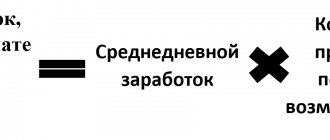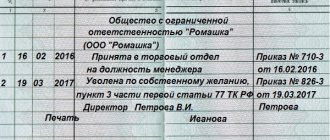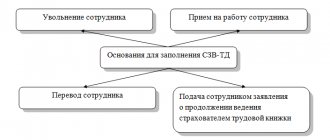Absenteeism, unfortunately, is a fairly common occurrence not only in educational institutions; it also happens in the workplace. Employers who are dissatisfied with the unjustified absence of an employee may refuse to continue to cooperate with the truant, dismissing him under the relevant article of the Labor Code. At the same time, in order for such a dismissal not to be challenged in the future, it is necessary to strictly comply with the administrative “regulations”, and most importantly, to correctly qualify absenteeism from the point of view of labor legislation.
Question: Is it legal to dismiss an employee who does not go to work during a period of downtime if the employer’s LNA does not indicate the employee’s right not to go to work during such a period? View answer
The absentee does not agree with the dismissal: can it be challenged?
Absenteeism is a violation so serious that even a single proven case is sufficient by law to dismiss the offender. After all, sometimes employee absenteeism can be fraught with serious unpleasant or even fatal consequences for the entire activity of the enterprise.
However, when dismissing on the basis of absenteeism, the employer must strive to avoid mistakes that could lead to challenging the dismissal in court. If the decision is positive, the plaintiff’s dismissal for absenteeism will be considered illegal.
Question: The employee presented the employer with a sick leave certificate for payment. When checking the authenticity of the sick leave certificate presented, it turned out that it was fake. Is it possible to fire an employee for absenteeism in this case? View answer
This entails the reinstatement of the dismissed person in his previous position with payment of salary for the entire period, from unfair dismissal to the end of the trial, and in some cases, compensation for moral damage. This, unfortunately for the employer, is possible if:
- the reason for dismissal for absenteeism was a fact that is not absenteeism as defined by legislative documents;
- the algorithm of actions during the dismissal procedure due to absenteeism was violated;
- There were errors and inaccuracies in the preparation of relevant documents.
Let's consider how to maintain accuracy in each of these points so that everything is flawless from the point of view of current legislation.
Question: An employee submitted a written application for three days of leave at his own expense in connection with the death and funeral of his brother. The General Director, who accepted the application, verbally authorized the granting of leave. However, the application does not contain a visa for the general director, and no order was issued to grant leave. The employee did not show up for work. Is an employee subject to dismissal for absenteeism? View answer
Truancy through the eyes of the law
The Labor Code of the Russian Federation in subparagraph a 6 of paragraph 1 of article 81 clearly defines this disciplinary violation and describes the possible actions of the employer provided for in legislative acts.
Question: Is it possible to fire an employee for absenteeism who did not notify the organization of his absence from work in connection with participation in elections as a member of the election commission, if the election commission received a proposal from the employee 3 days after the elections? View answer
According to the Labor Code, absenteeism is an employee being outside the workplace during the working day or shift (regardless of its duration) or being absent during working hours for more than 4 hours in a row or cumulatively for a shift for reasons considered disrespectful by the employer.
NOTE! Exactly 4 hours of absence is not absenteeism! Lunch break is not included in the time calculation.
Question: Can an organization fire an employee for absenteeism if, when transferred to remote work, but in the absence of a written agreement for the transfer, the employee does not appear in the office, considering the terms of the employment contract to be changed? View answer
What else will be considered absenteeism?
The legislation also includes absenteeism as absenteeism in the following cases:
- unauthorized termination of work before the expiration of the employment contract;
- time off that was not agreed upon with management (the employee’s right to rest for reasons provided for by law, for example, after donating blood, is not considered time off);
- did not work the required two weeks after submitting the resignation letter (or 3 days if the outgoing employee is on a probationary period);
- unauthorized departure on vacation not included in the schedule.
ATTENTION! If the employer has not provided the leave required by law, the time of which is not left at his discretion, then even unauthorized rest in this case cannot be considered absenteeism.
Employee absenteeism report. Basic moments
Before the manager or HR person begins to draw up this act, of course, he must contact the offending employee and find out the reason for not showing up for work. Anything can happen, and there are force majeure events. In the absence of valid reasons, a report on this situation is drawn up (see → how to write a report on absenteeism + sample 2021). Such a note ends up on the desk of a higher-ranking manager of the organization, and then the manager writes his own resolution on this matter.
The resolution is the basis for drawing up an act. This situation applies in large companies. If in an organization an employee directly reports to the manager, then the basis for drawing up an absence from work report is considered to be a special order from the manager with information about the details of the violation, sent to the personnel department or accounting department with instructions to draw up this report. Further, on the basis of this act, the necessary entry about the employee’s tardiness or absenteeism is made in the time sheet.
Before hiring, an employee must, as mentioned above, familiarize himself with the conditions and responsibilities for violating the work schedule. And since absenteeism is a violation of the regime, usually for unexcusable reasons, a disciplinary sanction is imposed on the employee, often financially. But at the same time, each drawn up act of absence from the workplace is accompanied by an explanatory note from the violator, on the basis of which the manager takes certain disciplinary measures or does not take them.
What reason for absence will be approved?
The Labor Code does not provide a list of valid reasons for absence from work; usually these are considered to be events supported by documentary evidence. In the event of an appeal against dismissal, the court will not consider the following to be absenteeism:
- temporary loss of ability to work due to health reasons - a certificate from the treating organization is required;
- emergency situations (natural disasters, communal troubles, misfortune that happened to loved ones);
- transport problems (disruption of public transport, flight delays or cancellations, etc.) - it is better to obtain a certificate from the transport company;
- performance during working hours of public or state duties provided for in Art. 170 Labor Code of the Russian Federation;
- donation;
- strike of company employees;
- the employee being in custody;
- absenteeism from work overtime;
- disagreement to interrupt a planned vacation;
- absence from performing activities prohibited to the employee for medical reasons;
- refusal to transfer to work in another location.
IMPORTANT INFORMATION ! If an enterprise delays employees’ salaries for more than 15 days, then employees can suspend work activities by notifying their superiors in writing, and this cannot be regarded as absenteeism.
If the manager voluntarily released the employee at his request, of course, his absence is not absenteeism. But if the boss wants to fire a person for some reason, he may take advantage of this situation in bad faith if permission to leave the job was given privately. If the employee is not on the best terms with the employer, then in such circumstances it is better to record the permission in writing or talk to the manager in the presence of several people.
How many absenteeism must there be for dismissal under the article?
Hello, in this article we will try to answer the question “How much absenteeism should there be for dismissal under the article.” You can also consult with lawyers online for free directly on the website.
In connection with this fact, each manager decides at his own discretion for how many absences to fire an employee.
This is important to know: Notice of dismissal due to liquidation
Vacation period. Everyone has the right to take the whole day off. You can call from it by agreement with the worker. Medical Bulletin. An employee has the right to refuse to perform actions that are contraindicated for him due to health reasons.
How to properly fire a truant worker
If the employer has decided to fire, and not to use other measures of influence permitted by law on the absentee employee (reprimand, deprivation of bonus, etc.), then he must adhere to the procedure prescribed by Art. 193 Labor Code of the Russian Federation.
Step-by-step algorithm for the employer:
- Documentary recording of absenteeism by an act of absence from the workplace with signatures of witnesses or a memo in which the immediate supervisor notifies the superior about the absence of his subordinate from the workplace.
- Requiring an explanatory note from a potential truant. It must be submitted within 2 days, otherwise the reason for absence will be considered unsatisfactory. If such a note is not received, an act of refusal of the employee to explain is drawn up.
- Issuance of an order for the enterprise on dismissal according to subclause a, clause 6, part 1, article 81 of the Labor Code of the Russian Federation (form T-8, T-8a).
- Familiarization of the dismissed employee with the order against signature within 3 days, drawing up a report in case of refusal to sign.
- Making a corresponding entry in the work book and handing it over to the person being dismissed. If an employee does not show up for a work book, he is sent a notice of this possibility (by a notification letter or by courier to the address specified in the contract). It is strictly not allowed to send the work itself in this way.
- Payment to the employee on the day of dismissal. Payment of wages for hours worked, calculation of compensation for vacation days if they are not used, and, if necessary, payment for sick leave.
FILES Act on absence from work (sample) in DOC Memo (sample) in DOC Explanatory note (sample) in DOC
See also: Completed sample and blank form of the T-8 form.
Normative base
The Labor Code provides for three main reasons for termination of an employment contract:
- employee's desire, Art. 80 TK;
- initiative of the administration, art. 81 TK;
- mutual consent, Art. 78 TK.
If an employer has justified complaints against an employee, then the code gives him the right to bring the offender to disciplinary liability, Art. 192 TK. This can be expressed in the form of a reprimand, reprimand or dismissal. The form of punishment is determined by the employer himself, based on his idea of the severity of the offense and the circumstances of its commission.
This is important to know: Are 2 weeks of work paid upon dismissal?
In order to ensure objectivity when making a decision, the law obliges the employer to first demand from the employee an explanation of the reasons for his behavior, and gives the employee the right to appeal the employer’s actions, Art. 193 TK. A correct assessment of the situation is especially important when imposing a penalty in the form of dismissal on the basis of clause 5 of Art. 81 TK.
This paragraph indicates repeated violation of labor duties. Based on the rules of the Russian language and normal logic, it is assumed that there should be more than one evidence of neglect of work. How many reprimands are needed to dismiss an employee, and what their nature should be, is not specified in the code, so those with at least one reprimand should think about the possible consequences.
A second violation of the job description, without justifiable reasons or due to intent, may result in dismissal at the initiative of management.
Dismissal due to reprimands
Article 81 of the Labor Code describes in detail cases when an employer can terminate an employment relationship without the employee’s desire. However, this does not mean that the employee’s opinion will not be asked. The requirement for a mandatory explanation of the employee’s point of view or circumstances before bringing him to disciplinary liability is contained in Art. 193 TK. You need to approach the issue of requesting a written explanation especially carefully when, based on the results of a review of the specialist’s actions, it is decided to dismiss him.
Some of the reasons from Art. 81 of the Labor Code provide for the possibility of dismissal without penalties, on the basis of other documents. But there are grounds that imply that for misconduct you can either be reprimanded or fired:
- repeated violation or failure to fulfill labor duties, clause 5 of Art. 81 TK;
- gross violation, even a single violation, of work duties and labor discipline (absenteeism, drinking alcohol, theft, disclosure of confidential data, etc.), clause 6 of Art. 81 TK;
- commission of an immoral offense by a teacher, clause 8 of Article 81 of the Labor Code;
- making an unreasonable decision by the manager, which resulted in harm to the company, clause 9 of Art. 81 TK
The greatest number of questions arise regarding the concept of “repeated failure to fulfill” duties and how many reprimands are enough for dismissal. At least two scenarios are possible. First, the employee systematically commits negligence, and the employer suffers. Second, the employer, for some reason, evaluates the work of the unwanted specialist too pickily and intends to make room.
Negligence or Harassment
| The employee is truly negligent | An employee is being harassed by superiors | |
| First penalty | It is impossible to dismiss for the first case of failure to perform duties, unless it is classified as gross. The maximum punishment is a reprimand. When announcing it, it is necessary to take into account the employee’s explanations, Art. 193 TK | Even if the boss has firmly decided to reprimand, it is necessary to carefully and fully disclose the circumstances justifying the employee in the text of the explanatory note. If the guilt is obvious, then try to make repentance touch the soul of the leader or supervisory authority. |
| Repeated offense | Already the second case of non-compliance with a work instruction may fall under the concept of “repeated”. But the employer must understand how many valid reprimands there must be for dismissal. If the problem arose due to a lukewarm attitude towards work, and its reasons cannot be attributed to valid reasons, then the employer may not accumulate penalties. Instead, the manager has the right to immediately initiate dismissal. True, if more than 365 days have not passed since the first punishment was imposed, Art. 194 TK. | If troubles at work were the result of a mistake or some difficult life circumstances, then management will not be able to prove in court the validity of such harsh disciplinary action as dismissal “under the article”. The maximum possible option is a new reprimand. After all, in paragraph 5 of Art. 81 of the Labor Code clearly states that failure to fulfill duties must be intentional, without good reason. An error is considered to be an unfavorable development of events due to a conscientious error in the performance of one’s work. |
| Dismissal | To ensure that dismissal under such a “bad” article does not become the subject of litigation in court and does not lead to the person’s reinstatement, you need to take care not only of drawing up explanations, acts and orders, but also collect documents confirming the severity of the consequences of the employee’s actions for the company. | Illegal dismissal is not a reason to get upset and give up. If an order is issued, but the employee has reason to believe that the contract with him was terminated for subjective reasons, then he needs to prepare reasons for his arguments for the court and file a claim for reinstatement at work within a month from the date of delivery of the dismissal order, Art. 392 TK. |
This is important to know: Is it possible to withdraw a resignation letter at your own request?
Procedure
The procedure for action in the event of a repeated case of failure to fulfill obligations coincides with that set out in Art. 193 TK:
- Detection of negligence and its documentation.
- Requesting explanations from a specialist.
- Drawing up a refusal to explain, if this took place, in the presence of witnesses.
- Assessing the essence of explanations.
- Deciding on the type of recovery. If the previous punishment has not expired, then dismissal may become a new one.
- Issuance of an order to impose disciplinary liability in the form of dismissal. In this case, no reprimand is given.
If they decide to dismiss an employee under clause 5 or 6 of Art. 81, then he can no longer be reprimanded or reprimanded, Art. 193 TK.









